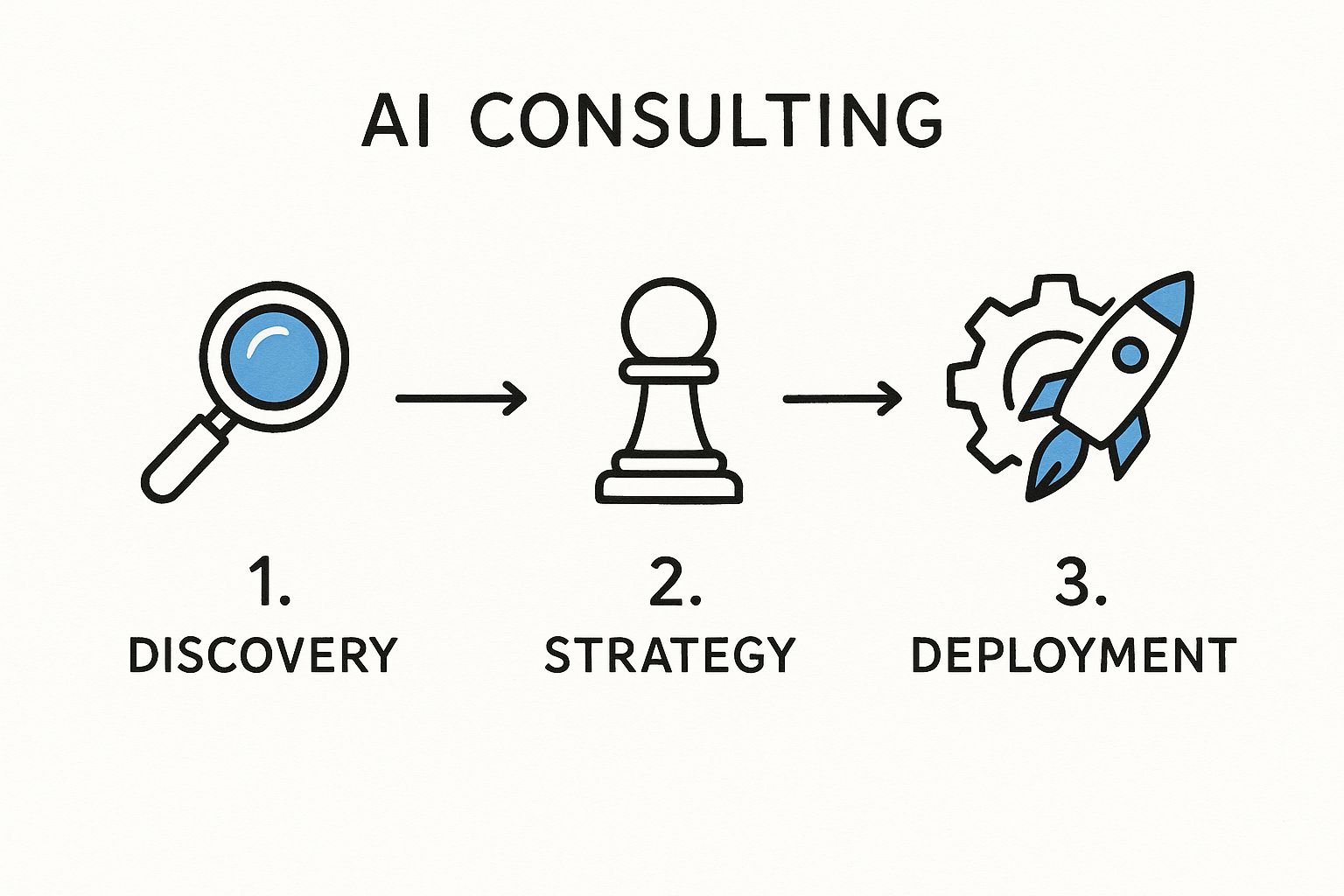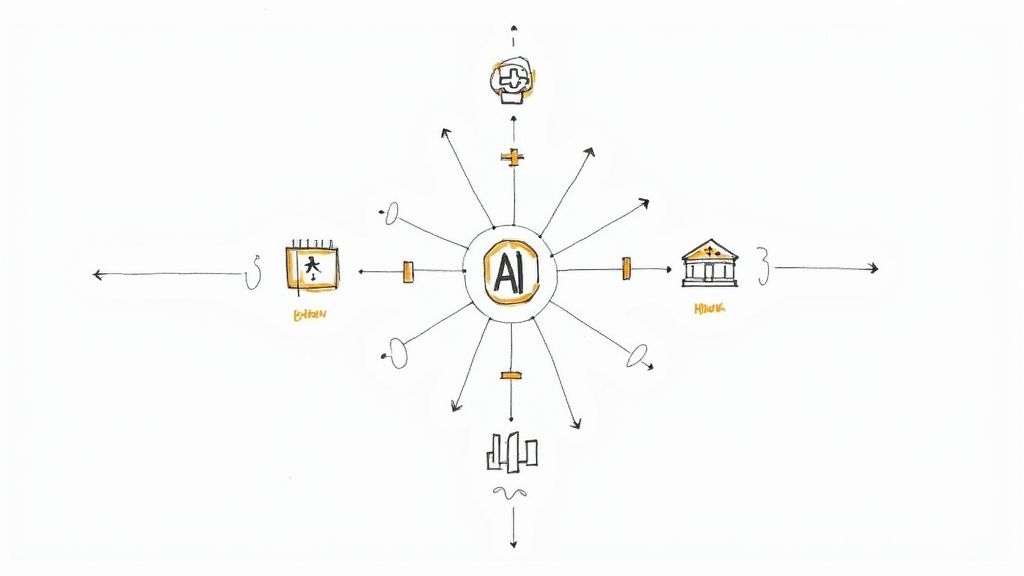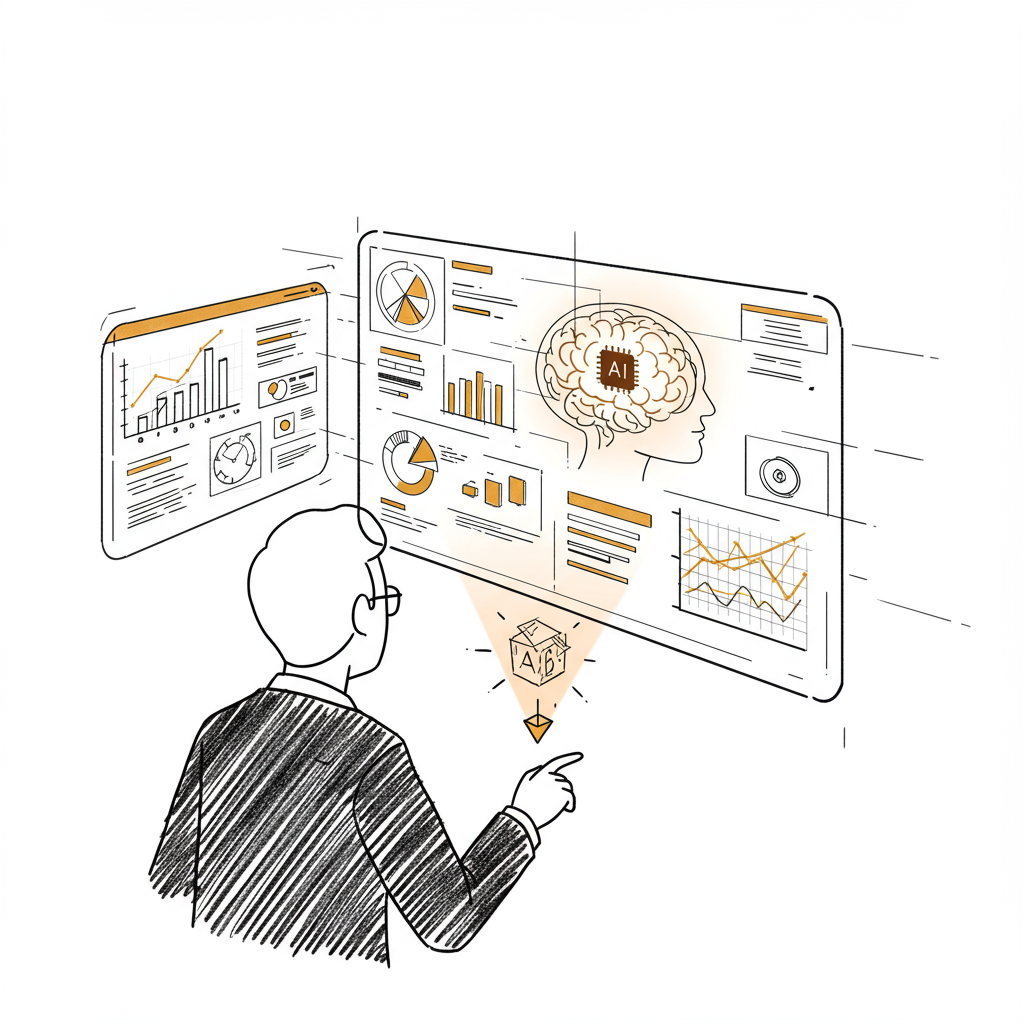A Practical Guide to AI Consulting Services
Discover how AI consulting can transform your business. This guide explains key services, strategy development, and how to choose the right partner.

Stepping into the world of artificial intelligence can feel a bit like exploring a vast, unfamiliar territory. AI consulting is essentially hiring an expert guide for that journey. These specialists know the terrain inside and out. They can spot valuable opportunities you might miss and help you navigate around the hidden pitfalls that often accompany new technology.
What Is AI Consulting and Why Does It Matters Now?

AI consulting is a specialised advisory service where experts help businesses figure out how to best use artificial intelligence. It’s all about creating a clear plan to implement AI solutions that solve real-world problems and push your company forward. This service closes the gap between the exciting promise of AI and the nuts-and-bolts reality of making it work for your organisation.
Think of it this way: anyone can buy a set of professional kitchen knives, but it takes a trained chef to turn a pile of ingredients into a fantastic meal. In the same way, while AI tools are more accessible than ever, an AI consultant brings the expertise needed to pick the right tools, integrate them properly, and cook up a recipe for genuine business success.
This kind of expert guidance is absolutely critical right now. As companies race to adopt AI, the right advice ensures your investments are smart, directly support your goals, and deliver a tangible return. Without a clear plan, it's all too easy to waste money on the wrong technology or, worse, implement something that fails to create any real value.
The Surge in Demand for AI Guidance
The market for AI consulting is growing at a staggering pace, which tells you just how much businesses are looking for help. Valued at roughly USD 16.4 billion in 2024, the global market is expected to skyrocket to an incredible USD 257.60 billion by 2033, climbing at an annual rate of 35.8%. This boom is fuelled by sectors like finance, healthcare, and retail, all looking to AI to improve how they operate and serve their customers.
Here in the Netherlands, this trend is particularly strong as companies seek expert partners to help them tackle complex new challenges. A telling statistic is that 62% of businesses globally are concerned about the ethical risks of AI, which naturally increases the demand for consultants who understand governance and responsible implementation. You can find more details on this explosive growth in recent market research about AI consulting services.
This rapid adoption is creating a clear divide between businesses that use AI well and those that are just fumbling in the dark. A solid AI strategy consulting approach gives you the map and compass needed to navigate this new landscape, ensuring you end up on the winning side.
From Confusion to Clarity: The Consultant's Core Role
At its heart, an AI consultant’s job is to bring clarity to a very complex field. They help you get solid answers to the foundational questions that will make or break your AI initiatives.
Here's a snapshot of the key areas where modern AI consultants focus their efforts, turning complex technological potential into concrete business outcomes.
| Key Focus Areas in Modern AI Consulting |
| :--- | :--- | :--- |
| Focus Area | Business Objective | Example Application |
| Strategy & Roadmapping | Aligning AI initiatives with core business goals. | Developing a multi-year plan to introduce automation into customer service, starting with chatbots and progressing to predictive support. |
| Data Readiness Assessment | Ensuring data quality and infrastructure can support AI. | Auditing a retailer's sales data to identify gaps and create a pipeline for clean, model-ready information. |
| Custom Model Development | Building bespoke AI solutions for unique challenges. | Creating a proprietary fraud detection model for a fintech company that outperforms off-the-shelf options. |
| Ethical AI & Governance | Implementing AI responsibly and ensuring compliance. | Establishing a review board and bias-detection protocols for a healthcare provider using AI for diagnostic imaging. |
| Change Management | Preparing the organisation and workforce for AI integration. | Designing training programmes to upskill employees whose roles will be augmented by new AI tools. |
Ultimately, a consultant helps you move past the hype and develop a practical, high-impact plan.
This partnership turns what could be a confusing and risky venture into a structured and strategic advantage.
By partnering with an expert, you shift from a reactive mode of just trying to keep up with trends to a proactive one, where you deliberately use AI to build a lasting competitive edge. We call this collaborative process AI co-creation, and it ensures the solutions we build are woven directly into the fabric of your business goals.
Understanding the Core Services of an AI Firm

When you team up with an AI consulting firm, you’re not just buying a piece of software. You're bringing on a partner with a specialised skillset, focused on solving very specific business problems. These services are much more than just advice; they provide a structured way to take your AI ambitions and make them real, operational parts of your business. It’s all about moving from educated guesses to a clear, collaborative plan.
The heart of a great partnership is AI co-creation, a model where consultants work right alongside your own people. This approach makes sure that whatever is built is a natural fit for your company, blending expert knowledge with your team's unique insights and business goals. Innovation becomes a team sport, not just a task you've handed off.
From Blueprint to Build: The Strategy and Discovery Phase
The first and most critical service is strategy development. Good AI strategy consulting isn’t about generating a generic report full of buzzwords; it's about crafting a custom-made blueprint for your company's future. This plan gives you a clear, prioritised roadmap for putting AI into action.
The whole process kicks off by asking some fundamental questions. What are the real business challenges we’re trying to solve here? Where will AI give us the biggest bang for our buck? What data do we actually have, and what else might we need? The answers to these questions become the bedrock of a bespoke AI strategy framework.
A well-defined strategy acts as your North Star, guiding every decision, investment, and project. It ensures that every action taken is a step toward a measurable business outcome, preventing costly detours and wasted resources.
Once the high-level strategy is set, it’s time to get into the nitty-gritty. This is where a detailed AI requirements analysis is absolutely essential. Think of it as the deep dive that turns a big strategic idea into a concrete project specification that developers can actually work with.
This service involves:
- Defining Functional Needs: Pinpointing exactly what you need the AI system to do. For example, "reduce customer service response time by 40%."
- Outlining Technical Specifications: Figuring out the necessary data, the right algorithms, and how the new system will connect with your existing tech.
- Establishing Success Metrics: Setting clear, quantifiable KPIs so you know what success looks like and can measure it accurately.
This detailed analysis is the bridge between your vision and the code that will bring it to life. It makes sure everyone, from stakeholders to developers, is on the same page and working from the same plans.
Implementation and Beyond: Execution and Evolution
With a solid plan in place, the focus shifts to actually building it. This is where many AI projects can stumble without an experienced guide. AI consulting firms provide the project management and technical oversight needed to handle the complexities of development and deployment. This phase often starts by building a proof-of-concept model to test out the idea before going all-in on a full-scale rollout.
These initial models are invaluable. They let you test your assumptions, get early feedback, and show tangible value to stakeholders right away. Looking at real-world use cases from similar projects can provide fantastic insights at this stage, helping you fine-tune your approach and sidestep common pitfalls.
But an AI consultant’s job doesn't stop once the system goes live. The final piece of the puzzle is all about continuous improvement and scaling. AI models aren't "set it and forget it" tools; they need to be monitored, maintained, and retrained with new data to stay sharp and effective.
Consultants help you put the right governance and maintenance routines in place for long-term success. They also help upskill your own teams, giving them the confidence and ability to manage and evolve the AI solutions themselves over time. This transfer of knowledge is a crucial part of the engagement, ensuring your organisation builds a lasting, in-house AI capability. The guidance provided by our expert team makes sure this transition is smooth and that your business reaps the benefits of AI for years to come.
How to Build a Powerful AI Strategy Step by Step
A great AI initiative is built on a solid strategy. Without one, even the most impressive technology can become a dead end, leading to wasted resources and frustration. This guide breaks down how to create a practical plan that connects AI directly to your business goals and delivers a real return on your investment.
Think of it like planning a journey. You wouldn't just start driving without a destination in mind. Building an AI roadmap means figuring out where you want to go first—by defining your business objectives, spotting high-impact opportunities, and checking if you have the right fuel (data) for the trip.
Step 1: Define Your Business Objectives
Before a single line of code is written or an algorithm is chosen, you have to answer one simple question: What business problem are we actually trying to solve? A successful AI strategy is always grounded in business outcomes, not just a desire to use new tech.
Start by setting specific, measurable targets. Are you looking to:
- Boost efficiency by automating mind-numbing, repetitive tasks?
- Improve the customer experience with truly personal interactions?
- Cut costs by fine-tuning your supply chain logistics?
- Generate new revenue with products built on data insights?
Nailing down these objectives gives you a "why" for your entire project. This clarity ensures every decision you make from here on out is pulling in the same direction, helping turn your AI investment into a direct contributor to your bottom line.
Step 2: Identify High-Impact Use Cases
Once you know your destination, you can start mapping out the routes to get there. This means brainstorming potential AI use cases that align with your objectives. The goal isn't to list every possible application of AI; it's about finding the ones that will deliver the most value, as quickly as possible.
A common pitfall is diving headfirst into massive, complex projects. A much better approach is to "crawl, walk, run." Pinpoint a few use cases that are high-impact but low-complexity to get some early wins and build momentum.
For instance, a retailer wanting to make customers happier might start with an AI chatbot for instant support. That’s a quicker win than building a complex demand forecasting model from scratch.
Step 3: Assess Your Data and Technology Readiness
AI is hungry for data. A crucial, and often overlooked, step is to take an honest look at your current data situation. You need to know what data you have, where it’s stored, how clean it is, and if you can even get to it.
This process involves a thorough audit of your technical foundations.

This assessment goes beyond just data. It also means evaluating your existing tech stack and, just as importantly, the skills of your team. Do you have the right infrastructure to run AI models? Does your team have the know-how, or will you need to train them up or bring in an expert partner?
Step 4: Develop Your Roadmap and Execute
With all the pieces in place, it’s time to assemble your action plan. A proper AI roadmap should lay out a clear sequence of projects, complete with timelines, who’s doing what, and the key performance indicators (KPIs) you’ll use to measure success. For a deeper dive, our guide on building an AI strategy can help you create a comprehensive framework.
This strategic approach has been particularly effective for small and medium-sized enterprises (SMEs) in the Netherlands looking to become more efficient. Dutch businesses are increasingly using AI to automate routine work like content creation (25%), business planning (25%), and transcription (19%), which helps them optimise their workflows and get more from their investments.
Once the roadmap is set, it’s time to start. Kicking off with a pilot project is usually the best way forward. It lets you test your ideas on a small scale, learn valuable lessons, and fine-tune your approach before committing to a full rollout.
Remember, an AI strategy isn't a "set it and forget it" document. It’s a living plan that needs to be revisited and adjusted as your business grows and new opportunities appear. This iterative cycle is what turns AI ambition into a real, lasting advantage.
Exploring Real-World AI Consulting Use Cases
Theory is great, but the real proof of AI consulting is in the results. Talking about what AI could do is one thing; seeing it solve actual business problems and deliver measurable value is another entirely. To bring the promise of AI to life, let’s explore a few scenarios where expert guidance turned technological potential into a real competitive edge.
Thinking in terms of stories helps to picture what’s truly possible for your own organisation. It’s never about the tech for its own sake—it's about the strategic impact on your bottom line. You can find a much broader library of these success stories on our dedicated page for real-world use cases.
Transforming Operations with Predictive Power
One of the most immediate ways AI can make a difference is by optimising complex operations. Businesses in logistics, manufacturing, or supply chain management are often sitting on a goldmine of data without realising it. An AI consultant can help them transform that raw information into a powerful predictive engine.
Take a national logistics company, for example, that was struggling with soaring fuel costs and frustrating delivery delays.
- The Problem: Their routing system was rigid and couldn't adapt to real-time traffic, bad weather, or sudden changes in delivery volumes. This meant inefficient routes, wasted fuel, and missed delivery windows—all of which hurt their profits and reputation.
- The Solution: An AI consulting team stepped in to help them build and launch a dynamic route optimisation engine. This new system crunched historical data alongside live variables to map out the most efficient delivery path for every single driver, every single day.
- The Outcome: The results were dramatic. The company slashed its average delivery times by 22% and cut fuel consumption by 15% in the first six months alone. They didn't just save a lot of money; they also built a name for themselves as a highly reliable service.
This is a perfect example of AI helping a business shift from being reactive to proactive. Instead of just putting out fires, they started preventing them before they could even start.
Enhancing Security and Reducing Risk
In the financial world, the sheer speed and volume of transactions make it impossible for human teams to monitor everything for fraud. This is where AI shines. It can spot subtle, suspicious patterns that are completely invisible to the human eye. Here, an AI consulting project focuses on building systems that protect a company's assets and customers without getting in the way of legitimate business.
Let's look at a financial firm that was dealing with a huge spike in fraudulent transactions.
- The Problem: Their old, rule-based fraud detection systems were too slow and easily tricked by clever criminals. By the time a fraudulent pattern was finally spotted, the money was often long gone.
- The Solution: Working with AI consultants, the firm rolled out a real-time anomaly detection system. This machine learning model was trained to understand what "normal" customer behaviour looked like, allowing it to instantly flag any transaction that strayed from that baseline.
- The Outcome: The new system helped the firm cut fraudulent transactions by an incredible 40%. Because the AI could act in seconds, not hours, they were able to freeze suspicious accounts immediately, drastically limiting their financial losses.
This kind of highly specialised application is becoming the norm. In the Netherlands, for instance, the AI consulting industry is increasingly focused on specific sectors like logistics and finance. This specialisation means more precise insights and quicker results, as the AI models are built for the unique challenges of each industry. To see how these trends are shaping the Dutch market, you can read more about AI consulting predictions.
The goal is always to build solutions that are not only powerful but practical. For a deeper dive into how these ideas can be applied to your business, our hands-on AI strategy workshop provides a great starting point for turning possibilities into a concrete action plan.
How to Choose the Right AI Consulting Partner

Picking an AI consulting partner isn't just another procurement decision; it’s one of the most important moves you'll make in your company's evolution. Get it right, and you’ll have a guide who can speed up your progress and help you sidestep expensive pitfalls. Get it wrong, and you could be looking at wasted budgets, stalled projects, and a company-wide distrust of AI.
It’s crucial to look past the slick website and a convincing sales pitch. You need a solid, practical way to figure out who really has what it takes. This means digging into their technical skills, checking their industry track record, and getting a feel for how they work with clients and handle AI responsibly. To get a sense of what this looks like in practice, you can see the calibre of our expert team.
Look for Proven Technical Expertise
First things first: any potential partner needs to have serious technical chops. Their team should be fluent in the core components of AI, like machine learning, natural language processing, and the data engineering that underpins it all. Don't be shy about asking direct questions—which models have they used? What platforms are they experts in?
But here’s the thing: technical knowledge alone isn’t enough. True expertise is about applying that knowledge to solve actual business problems. A great partner can break down complex ideas into simple, understandable terms and, most importantly, connect every technical choice directly back to your business objectives.
Verify Relevant Industry Experience
AI is not a one-size-fits-all magic wand. The hurdles a retail company faces are worlds away from those in finance or manufacturing. That’s why your ideal partner must have a proven history of success in your specific industry.
When you’re looking at their past projects, go deeper than a simple list of client logos. Ask for detailed case studies that show you:
- The original business problem they were hired to solve.
- The exact AI solution they designed and implemented.
- The measurable results and return on investment they delivered.
This focus on real-world outcomes is what separates the seasoned pros from those just riding the AI trend. It proves they understand the unique operational quirks and regulatory pressures that define your field.
The best consultants don't just build technology; they build value. Their success is measured by your success—whether that's increased efficiency, reduced costs, or new revenue streams.
Evaluate Their Approach to Collaboration
An AI project is a true partnership, not just a purchase order. How a consultant communicates and collaborates is a massive indicator of whether the project will succeed. Do they genuinely want to work with your team, sharing knowledge and building capabilities together?
A good partner makes it a priority to understand your company culture and integrates smoothly with your existing teams. They should be open about their process, give you regular updates, and be committed to transferring knowledge so your people can manage the AI solutions long after they're gone.
Choosing the right firm is a critical first step. To help you structure your evaluation, we've put together a simple checklist. Use it to guide your conversations and compare potential partners on a level playing field.
AI Consulting Partner Evaluation Checklist
Evaluation Criterion
What to Look For
Red Flags to Avoid
Technical Expertise
In-depth knowledge of relevant AI models and clear, business-focused explanations.
Overuse of buzzwords with little substance; inability to explain tech in simple terms.
Industry Experience
Demonstrable success stories and quantifiable results from your specific sector.
Generic case studies with no specific metrics; limited or no experience in your industry.
Collaborative Fit
A clear process for knowledge transfer and a focus on empowering your internal team.
A "black box" approach where they work in isolation; reluctance to share their methods.
Responsible AI
A stated commitment to ethical AI, including fairness, transparency, and data privacy.
Dismissal of ethical concerns or lack of a clear governance framework.
By using these criteria, you can move beyond the sales pitches and make an informed, confident decision. Selecting the right partner sets the foundation for your entire AI journey and positions your business for lasting success.
Your Next Steps in AI Transformation
So, we've walked through the A to Z of AI consulting. You now have a solid grasp of what it is, how it creates value, and what goes into building a strategy and choosing the right partner. The path from a good idea to a real-world solution should feel a lot clearer now, and hopefully, you're seeing the potential for AI in your own organisation. This is a great foundation, but the real work starts when you turn this knowledge into action.
It’s time to shift from asking ‘what if’ to defining ‘what’s next’. This is your moment to build on the momentum you've created just by reading this far. Everything you've learned about strategy, use cases, and finding the right people to help are the tools you need to take the reins and start shaping your company's future with AI.
Turning Knowledge into Motion
Every successful AI project I've seen started with one focused, deliberate first step. You don't need all the answers right now. You just need to get the ball rolling. The trick is to start applying what you've learned here to your own specific business challenges.
To get things moving, here are a few concrete things you can do:
- Revisit Your Business Goals: Look at your company's main objectives again, but this time through an AI lens. Can you spot one or two areas where AI could make a genuine, significant difference?
- Start an Internal Dialogue: Share what you've learned with your team. Kick off a conversation about your biggest operational headaches or where you see the most promising opportunities for growth. This simple chat is often the seed for true AI co-creation.
- Explore Practical Tools: Sometimes, getting your hands dirty is the best way to learn. Try an AI Strategy consulting tool to map out a rough plan. A hands-on approach like this can make the whole idea feel much more real and achievable.
Taking action doesn't mean launching a massive, company-wide project overnight. It can be as simple as booking a single meeting to explore one high-potential idea. The aim is to build momentum, one small, practical step at a time.
As we explored in our AI adoption guide, having a clear structure takes the mystery out of the process and builds confidence along the way. The old saying is true: the journey of a thousand miles begins with a single step. For you, that first step is turning what you've learned into a focused internal discussion.
When you feel ready to explore these possibilities with someone who has been down this road before, the path forward starts with a conversation. The best AI strategy consulting is always a partnership—one that’s built around your specific goals.
Connect with our expert team to talk about your unique objectives. Let’s figure out how we can help turn your AI ambitions into results you can actually measure.
Frequently Asked Questions About AI Consulting
Even with a clear map, venturing into new territory can bring up a few last-minute questions. This section tackles some of the most common queries we hear about AI consulting, helping to clear up any final points of confusion and giving you the confidence to move forward.
How Much Does AI Consulting Typically Cost?
This is the big question, and the honest answer is: it varies enormously. The cost of AI consulting really depends on the project's scope, complexity, and duration. A brief strategic workshop might cost a few thousand euros, while a full-scale implementation could easily run into the hundreds of thousands.
Most firms offer flexible engagement models, like fixed project fees, monthly retainers for ongoing advice, or daily rates for specialised help. The key isn't just the price tag, but the return on investment (ROI). A good consultant will help you build a solid business case that clearly shows how the spend will generate tangible value, whether through better efficiency, new revenue streams, or significant cost savings.
My Business Has Very Little Data. Can We Still Use AI?
Absolutely. This is one of the most common misconceptions out there. While large, clean datasets are ideal for certain types of AI, many incredibly valuable applications don't need massive amounts of your own internal data. This is where expert AI strategy consulting truly shines.
An experienced consultant can introduce you to strategies that tap into external data sources, make use of powerful pre-trained models, or apply AI techniques designed specifically for smaller datasets. The process often starts with a simple assessment of what you have and what you might need. Sometimes, the best first move is just setting up better data collection practices for the future—a valuable outcome in itself.
What Is the Difference Between an AI Consultant and an In-House Team?
Think of them as complementary partners, not competitors. Your in-house team holds deep, irreplaceable knowledge of your business operations and culture. But they might not have the broad, cross-industry perspective or the specialised strategic experience an AI consultant brings to the table.
Consultants provide a fresh, external viewpoint. They live and breathe the latest technological advances and have seen what works (and what doesn't) across dozens of different projects and industries. They are perfectly positioned to help shape your initial AI strategy framework, pinpoint the highest-impact opportunities, and establish the right governance from day one.
They can upskill your internal team for long-term success or provide extra firepower for a specific, complex project. We see the most success with this kind of collaborative approach, which we call AI co creation.
How Long Does It Take to See Results from an AI Project?
The timeline for seeing a return depends entirely on the project's goals. Some initiatives can deliver value in just a few weeks. Think of using an AI Strategy consulting tool to map out your roadmap or performing an AI requirements analysis for an upcoming build.
More complex projects, like developing a custom predictive model from scratch, will naturally take several months to build, test, and integrate properly. A skilled partner will work with you to plan a phased approach with clear milestones. This often means starting with a small pilot project to prove the concept and show value quickly, which helps build momentum and get everyone on board before scaling up. Looking at a variety of real-world use cases can help set realistic expectations for your own timeline.
Ready to turn your AI ambitions into measurable results? The Ekipa AI platform is designed to help you rapidly discover and execute your most promising AI opportunities. Let our expert team guide your next steps.



